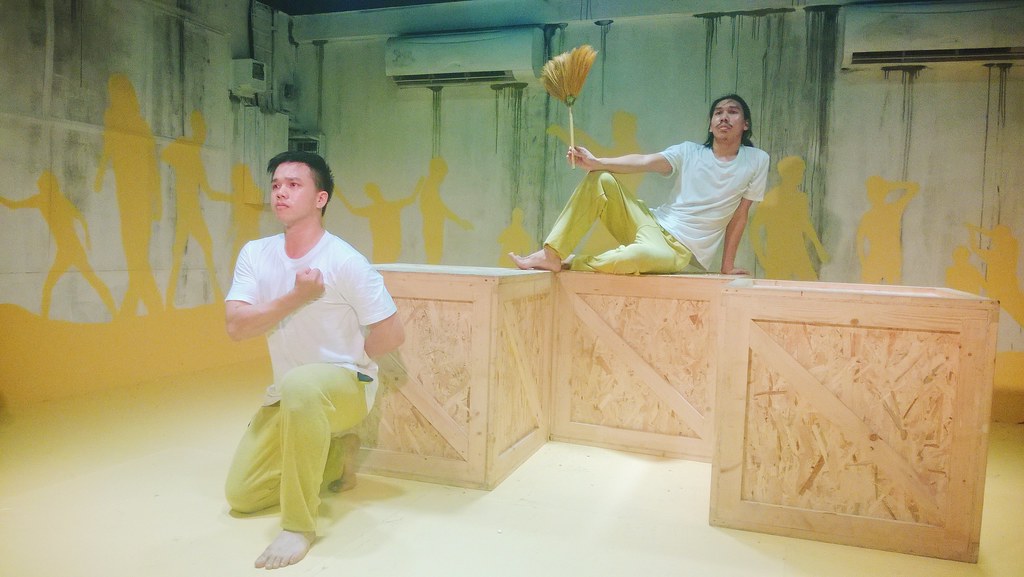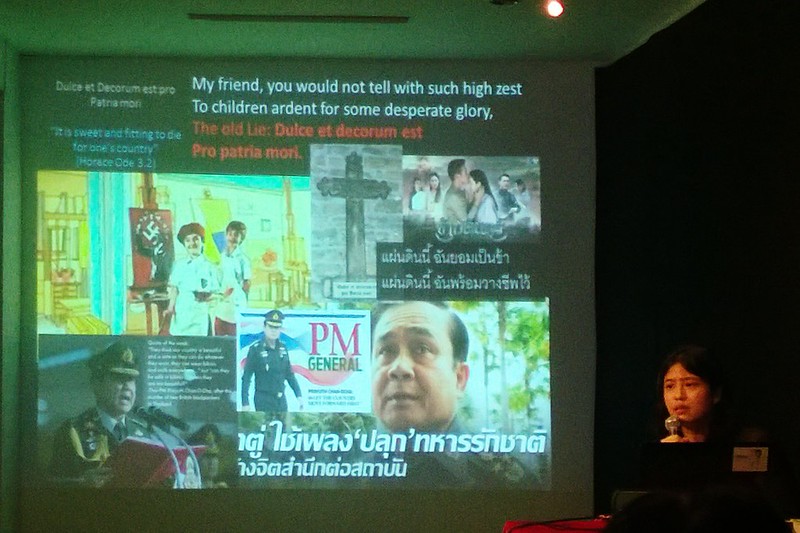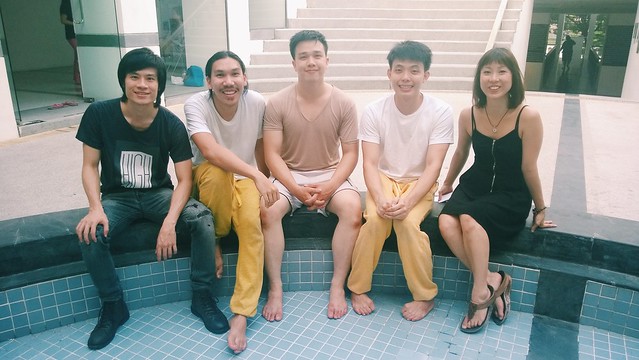Wasu Wanrayankoon and Kwin Bhichitkul in WW101.
A stage performance commemorating the 101st anniversary of the beginning of the First World War highlights how violence can quickly spiral into war.
B-Floor’s physical theatre piece was directed by Sasapin Siriwanij and Sarut Komalittipong. The performers were Wasu Wanrayankoon, Kwin Bhichitkul, and Thongchai Pimamansri.
The performance on 26 July was preceded by a lecture on the WWI artistic heritage from Verita Sriratana, lecturer at the Department of English, Faculty of Arts, Chulalongkorn University. Verita emphasized how the legacy of World War I included questioning the nobility of dying for one’s country, by referencing Wilfred Owen’s “Dulce et Decorum est.” Dying for one’s country is not “sweet and fitting,” it is an “old lie.”
Verita Sriratana explains current discourses of jingoism.
Verita also used the Czech novel “The Good Soldier Švejk” by Jaroslav Hašek as well as the film adaptation to demonstrate the absurdity of complete obedience to the military, such as even demanding to be wheeled to the front in a wheelchair.
Finally, the professor said WWI’s main effect on Thailand was Rama VI’s establishment of the Tiger Corps, as well as the jingoist legacy of using art and songs to perpetuate “the old lie.”
The stage performance’s hour-long physical theatre approached the legacy of WWI too, but through impressive acrobatics and use of props. The use of toy soldiers and guns shows how easy it is to indoctrinate the idea of war as noble. Actors attack each other with increasing violence, until the props of popcorn kernels explode, reminiscent of bullets.
B-floor’s WW101 is a riveting look into the nature of violence and how easily it can be ignited—as easy, in fact, as mixing salt and butter with popcorn kernels and waiting for a few seconds. The directors and artists talk to us about their inspirations behind the piece.
Left to right: B-Floor’s Sarut Komalittipong, Kwin Bhichitkul, Wasu Wanrayankoon, Thongchai Pimamansri, and Sasapin Siriwanij
How did you get inspired to create a WWI piece that involves popcorn?
Sarut: Well, this year is the 101st anniversary of the start of WWI, and I had been planning my directorial debut. So I thought, yep, this is my year to do a piece.
I was unfamiliar with WWI, especially Siam’s involvement in it. As I was researching I thought about what war is. How war is ignited, and how war is continual, up to the present. How when I was a child, I grew up with war, in the form of toy guns and soldiers. I thought, wow, it must be so cool to grow up and die for your country as a soldier.
I took those ideas, and since this is a small production in a smaller venue, I decided to focus on violence between people.
Sasapin: As for the popcorn, I wanted to find a prop that was would convey the meaning of being small, but very numerous, and therefore impactful. Coincidentally, there was some popcorn lying around during our first photoshoot for this piece, so we incorporated that.
Do you think Thailand is in a “popcorn” situation?
Sasapin: Recent events show how easily a situation can explode into violence. Even in Facebook comments about current events, people can really be belligerent and violent.
It’s like the scene in the piece, where the actors start fighting just because someone else refuses to get out of their way.
The piece led me to question whether there’s something in everyone that makes them prone to fight and go to war. How, then, is peace possible?
Sarut: Violence is an instinct in all of us. We don’t even need a reason to fight. There’s a saying that if you give a gun to a kid, you don’t even need to teach him how to use it.
Kwin: During rehearsal, I found myself inexplicably having fun with the violence.
Thongchai: Me too. We started from just slapping each other’s hands, and everything else you saw just spiralled from that. We hit each other until it didn’t hurt anymore. We hit each other harder and harder, not holding back, until we got used to the pain.
Sasapin: I think violence is part of human nature. Even as the directors and actors of this piece, we found ourselves having fun with the violence we sought to talk about. It’s important to be aware of our own nature, so that we know how to control ourselves and diffuse violence.
Wasu: Based on feedback from the audience, I learned that many audience members often find themselves enjoying the violence, and that surprised them, prompting self-examination. I’m glad if they’re prompted to think introspectively on that.
WW101 will be performing at Pridi Banomyong Institute (BTS Thonglor) until 3 August, showing at 8 pm from Mondays to Thursdays, and at 4 pm on Sundays. Book now at its Facebook event page.






